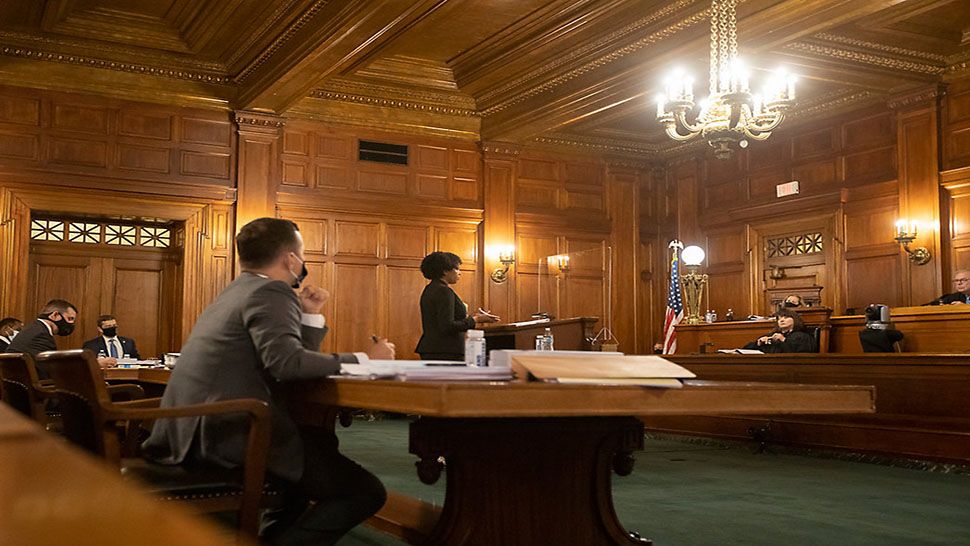FRANKFORT, Ky. — The seven justices of the Kentucky Supreme Court heard oral arguments Thursday over the constitutionality of some of Gov. Andy Beshear’s pandemic-related executive orders.
The dispute stems from a lawsuit filed on behalf of three Northern Kentucky businesses — a bakery, a race track, and a child care center — in mid-June. It argued that Beshear’s orders, put in place to slow the spread of a virus that has now killed more than 1,100 people in Kentucky, have unfairly harmed them.
By mid-July, it became clear that a Boone County Circuit Court judge was prepared to strike down all of Beshear’s executive orders related to the virus. That’s when the Supreme Court stepped in, ordering a halt to any injunctions to Beshear’s orders until it could review the cases.
On Thursday, one of those reviews took place, with the court hearing from a lawyer for Beshear, a lawyer for the businesses, and Kentucky Solicitor General Chad Meredith, who argued on behalf of Attorney General Daniel Cameron's office, which joined the plaintiffs suit earlier this summer.
Beshear’s general counsel, La Tasha Buckner, defended the legality of the governor’s orders and argued that tossing them out would hamstring leaders responding to future crises. “What the appellees are asking the court to do is unprecedented and deadly,” she said.
Meredith, meanwhile, said the 800 pages of executive orders and memoranda that Beshear has issued since the beginning of the pandemic is “incompatible with the rule of law in a Republic.” He accused Beshear of running afoul of Chapter 39A of Kentucky’s constitution, which grants the governor emergency powers, and of violating state law.
In several different exchanges, members of the court pushed back against Meredith’s argument that the legislature should have played a bigger role in the drafting of Beshear’s rules, citing its part-time nature and inability to call itself into special session.
It depends on the scope of the court’s ruling, said University of Louisville law professor Sam Marcosson.
“If they accept the Attorney General’s most extreme arguments, then the governor would be left powerless to issue any order to deal with COVID-19 and it would even call into question his ability to deal with almost any state of emergency,” Marcosson said.
It’s also possible that the court rules Beshear exceeded his powers while recognizing that he does have some power to issue emergency orders. “In that case, the governor would be able to cut back on the orders and still issue revised ones. Or he could seek the kind of local input that the court might tell him he has to obtain," Marcosson said.
If court sides with Beshear it would mean both that his existing orders remain in effect and that he has the ability to issue new ones as the pandemic requires. “That would be the ideal result from the governor’s point of view,” Marcosson said.
That's hard to say. But Marcosson said the most vocal justices Thursday seemed to "troubled by the Attorney General's position." He added: "To be honest, I've been very surprised by the position he's taken from the outset because it's so sweeping."
Both the governor and the attorney general spoke to reporters after Thursday’s hearing. Cameron said that Beshear’s orders exceeded the scope of his powers and hurt small businesses in the process. “Even in the midst of a pandemic, the constitution is not suspended," he said.
At his daily coronavirus briefing, Beshear said “I still can’t believe that these rules and restrictions have been challenged.” He said the steps he's taken have been taken by almost every other governor across the country. If he loses the case, he said, the virus will spread more and "more people will die."
"This would leave us with no tools to respond," Beshear said. "We would have fewer tools than any other state in the country."
Earlier this week, a federal judge in Pennsylvania ruled that Gov. Tom Wolf’s shutdown measures were unconstitutional. But in this case, U.S. District Judge William Stickman IV, was measuring the restrictions against the U.S. constitution. The state’s limits on gatherings and its business closures violated the First and 14th Amendments, Stickman ruled.
While Wolf is appealing the ruling, the practical effects of the decision, at least for the moment, are not that significant, a spokesperson said in a statement. Wolf has already ended the stay-at-home order and reopened businesses, albeit with capacity limits.
That's not clear at this point.



